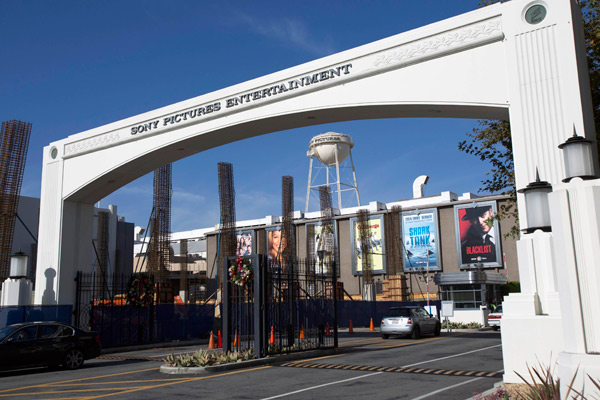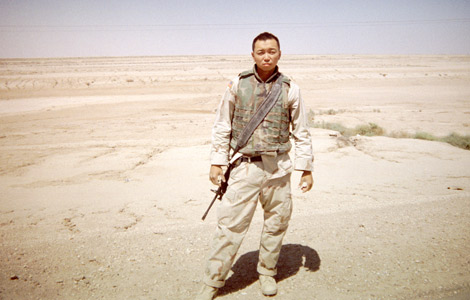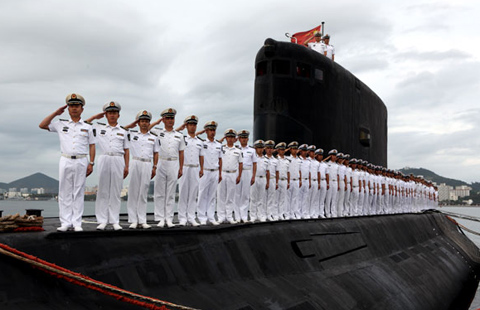Awaiting word from China on Sony hack
Updated: 2014-12-23 04:41
By ZHANG YUNBI in Beijing and CHEN WEIHUA in Washington(China Daily USA)
|
||||||||
|
 |
|
An entrance gate to Sony Pictures Studios is pictured in Culver City, California on Dec 19. US President Barack Obama said Dec 19 the US government expected to respond to the Sony hack, which he described as an expensive act of “cyber vandalism” that he blamed on North Korea. Mario Anzuoni / Reuters |
There may be a number of possible technical explanations behind the attack, experts said, and it is still too early for Beijing to form any conclusion before Washington provides tangible evidence.
US Secretary of State John Kerry briefed Foreign Minister Wang Yi on Washington's viewpoints about the cyber attack in a telephone conversation on Sunday.
China "opposes any manner of cyber attacks and cyber terrorism", the minister said, and added that Beijing is also "opposed to any country or any individual that launches cyber attacks via facilities in another country".
US media speculated last week that hackers could have taken advantage of the greater bandwidth in China to launch their attack.
"China is willing to embark on constructive cooperation with the international community to safeguard the peace and security of cyberspace on the basis of mutual respect and mutual trust," Foreign Ministry spokeswoman Hua Chunying said in Beijing on Monday.
The US FBI claimed on Friday that investigators had found what it called "enough information" to conclude that the Democratic People's Republic of Korea was "responsible" for the attack.
On Monday, US State Department deputy spokeswoman Marie Harf confirmed that Kerry has been seeking Chinese help on the issue. She said the US stands by the conclusion and urged the North Korea government to exercise restraint.
Harf accused North Korea of having "a long history of denying responsibility for destructive and provocative actions." "If they want to help here, they can admit their culpability, and compensate Sony for the damages that they caused," she said at the daily briefing.
Her words immediately backfired when Matthew Lee, an Associate Press reporter, asked how she would characterize US government record in that regard.
Over the weekend, North Korea denied any responsibility for the attack on Sony and has asked the US to apologize for linking it to the attack. North Korea has also offered to conduct joint investigation with the US on the issue.
Zuo Xiaodong, vice-president of China Information Security Research Institute, said Washington's decision to make public its accusations without offering any tangible evidence "may run against the spirit of science".
"As for servers of a private business, which are usually more vulnerable than governmental ones, the hacking may have been done by hackers acting on their own rather than a cyber army," Zuo said.
Earlier this month, Sony decided to cancel the scheduled Thursday release of the comedy movie The Interview, which depicts an assassination attempt on Kim Jong Un, leader of the DPRK.
In November, hackers accessed the Sony computer system and released some of the stolen data. The hackers threatened to disclose more Sony data if it went ahead with the movie's release.
US President Barack Obama said in a CNN interview aired on Sunday that he regards the hacking as an "act of cyber vandalism" rather than an "act of war," while reiterating the US will respond proportionately.
On Monday, North Korea's links to the Internet went completely dark after days of instability, the New York Times reported.
"If the attack was American in origin — something the United States would probably never acknowledge — it would be a rare effort by the United States to attack a nation's Internet connections. Until now, most operations by the United States have amounted to cyber espionage, mostly to collect defense information or the communications of suspected terror groups," the report said.
Contact the writers at zhangyunbi@chinadaily.com.cn and chenweihua@chinadailyusa.com

 Chinese dancer joins Nutcracker
Chinese dancer joins Nutcracker
 Learning, giving back through basketball
Learning, giving back through basketball
 Telling stories of the Chinese who fought for US
Telling stories of the Chinese who fought for US
 Top 10 economic events in 2014
Top 10 economic events in 2014
 Tajik herdsman's life through lens of a solider
Tajik herdsman's life through lens of a solider
 Yearender: Culture prohibitions in 2014
Yearender: Culture prohibitions in 2014
 Sleeping China 2014
Sleeping China 2014
 Yearender: 10 cultural 'firsts' in 2014
Yearender: 10 cultural 'firsts' in 2014
Most Viewed
Editor's Picks

|

|

|

|

|

|
Today's Top News
Commerce decision said to hurt US solar makers
Aid to slain NYC officers' families unites city
Shanghai index slides 3%
Tollways report loss of 66 bln yuan
Learning about 'Americanness' from Chinese-American vets
Awaiting word from China on hack
Alibaba IPO fuels startup boom to rival Silicon Valley
China's top Party offcial probed for disciplinary violations
US Weekly

|

|







